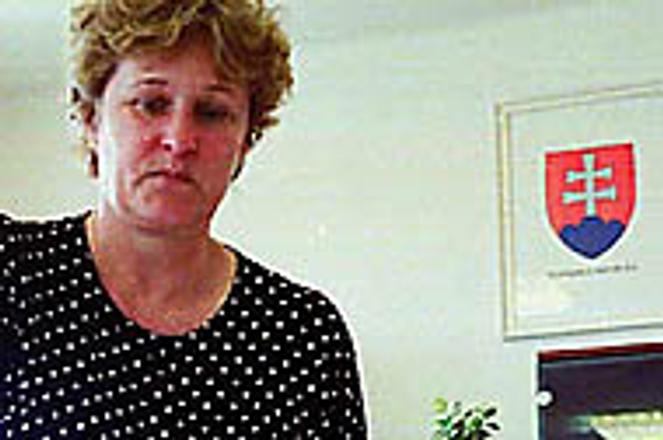Jana Dubovcová conducted a survey of her court; 30% of respondents said they had experienced corruption.photo: TASR
The Chief Justice of the Banská Bystrica Regional Court has turned the judicial sector on its head by carrying out a survey documenting the prevalence of corruption at her own court.
During 20 days in April, Justice Jana Dubovcová arranged that 281 people visiting her court be given a survey form to fill out, asking them if they had met with corruption at the court. Of the 30 people who completed and returned the forms, 30% claimed to have had direct experience of corruption, two thirds of whom said they had been asked for a bribe by a judge. The sums demanded ranged between 6,000 Slovak crowns and 150,000 crowns ($124 to $3,090), with the highest being paid in criminal law cases.
"Personally, I had been expecting a lower percentage," said Dubovcová. "We always thought it wouldn't be the judges [to be corrupt]. It sends a warning into the ranks. What struck me most, however, was how reliable and trustworthy the questionnaire answers seemed."
Dubovcová also expressed concern that 60% of the survey respondents said they had met the judges adjudicating their cases outside the courtroom, and had discussed the cases together. "It's surprising. I'm going to have to look into it," she said.
Corruption in Slovakia's courts has long been a matter of public concern. According to a year 2000 World Bank survey, 51% of business people and 56% of Slovak residents felt that corruption existed in the courts, figures that were second only to perceptions of corruption in the health care sector.
And in a survey performed by the GfK agency in Slovakia in February 2001, when asked what social behaviour they disapproved of most, 88.8% of people said corruption, over 15% more than disapproved of racial discrimination. Only corporal punishment of children was more criticized.
Given the Slovak public's declared low tolerance for corruption, Juraj Majchrák, head of the independent judges' group Zrduženie sudcov Slovenska (Slovak Judges' Association - ZSS) said that Dubovcová's initiative was welcome, and should be duplicated by other courts.
"The survey really opened some eyes, and showed that combating corruption in the judiciary is really needed," Majchrák said.
But another judges' group, the Rada Slovenských Sudcov (Council of Slovak Judges - RSS), on May 21 said that Dubovcová had "damaged the honour" of Slovak judges, and called on Justice Minister Ján Čarnogurský to fire Dubovcová. The minister, for his part, approved of the survey, saying he was sure it would prove "positive" for the judiciary.
Identifying corruption may be one thing, however, and getting rid of it another. Corruption specialists and economic experts have long said that the low wages of state employees in Slovakia were the main cause of much of the petty corruption that occurred in the country.
Santiago Pardo, a partner in the Bratislava office of the advisory firm Arthur Andersen, said: "It all comes back to the history of the country. It's a question of paying state employees proper wages in return for proper work. You also need to have the right number of employees in the cadaster, to show people they really have to work. It's the same with the police, the Ministry of Finance.
"You can't have people working for 7,000 crowns a month - it's ridiculous. They will find a way to complement this income. You also can't have 10 people doing work that two people could manage quite comfortably. With all the time the 10 people spend not working, they are thinking how to complement their 7,000 crowns.
"We need to reform the entire public administration system. It's a priority for this country, and in this sense we have done nothing."
The wages of Slovak judges are calculated according to a base figure that is three times the national average wage; based on last year's wage data, the base amount for judges is 34,000 crowns a month ($700). Majchrák said Slovak judges, on average, made 58% as much as their colleagues in the Czech Republic, and only 7.7% of what British judges earned.
"We're at the absolute tail-end of Europe in terms of salaries," he added.
Dubovcová, too, said money was at the root of her court's problem. Noting that her survey found that most people who paid bribes did so to speed up their cases, she said: "The easiest way to make this court quicker would be for the state to invest half a million crowns into technical equipment and people. If the state has any interest in this [speeding up the courts and cutting corruption] it has to invest."
For others, though, the latest survey is simply further confirmation of a deeply disturbing trend. Petr Šabata, editor of the daily paper Pravda, said that he had been deeply struck since coming to Slovakia two months ago by the ease with which people seemed to be able to bribe judges.
"Judges are supposed to be the last bulwark against corruption in society, but when even they can be bribed, that's terrifying," he said.



